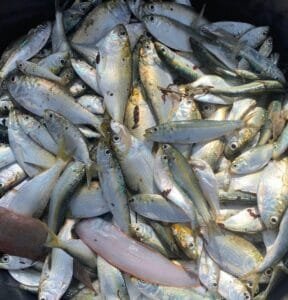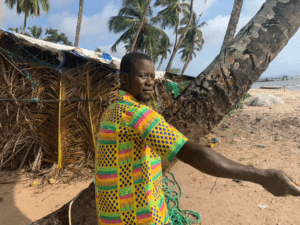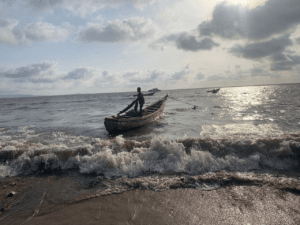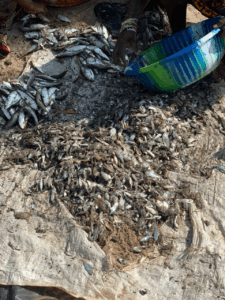By Ibrahim Mansaray.
Surviving A Dwindling Fish Stock: The Fate of Artisanal Fishermen in Sierra Leone

As the sun sets, and the brightness of the day begins to fade at the Banda Wharf Community, Lungi northern Sierra Leone, fisherman David Fatorma wraps up his activities for the day. The little catch he made had been sold, earning him an amount he says is only enough for a day. He has been an artisanal fisherman for over two decades but in the last couple of years he has seen a steady decline in catch.
Fishermen attribute the decline to illegal fishing by industrial vessels. Sierra Leone, like other coastal nations, has an area reserved for artisanal and recreational fishing known as the Inshore Exclusion Zone (IEZ). However, in 2023, evidence emerged of industrial vessels fishing in these zones.
“We don’t have a demarcation between us and trawlers,” Fatorma.
Authorities in Sierra Leone deny this, citing measures they are taking to prevent industrial vessels from incurring the IEZ such as outfitting them with Vessel Monitoring Systems (VMS) and stationing government observers in licensed trawlers that set out.
These measures have not helped much as fish stock continues to be depleted
The Ministry of Fisheries’ Director of Fisheries Khadijatu Jalloh is quoted as saying illegal industrial fishing is not a problem in Sierra Leone. However, artisanal fishermen say industrial vessels continue to make life difficult for them.

Fisherman David Fatorma (Photo: Ibrahim Mansaray)
Surviving Through Unsustainable Fishing Practices
To survive, Fatorma and other fishermen have resorted to unsustainable fishing practices such as beach seining. The practice is banned in Sierra Leone due to its tendency to target juvenile fish. It is very popular, regardless.
“Almost all artisanal fishermen across the country are engaged in this fishing method,” Alhaji Kamara, another fisherman at Banda.
Local fishermen also engage in channel fishing, encircling marine shallows or coastal rivers with under-sized mesh nets, capturing juvenile fishes and even the eggs.
The country’s population increase has also seen a corresponding increase in the number of artisanal fishermen. There are about 14,000 registered artisanal boats according to Sallieu Sankoh, a local fishing expert.

A lad helps his elder brother to drag their net to sea at Banda Wharf (Photo: Ibrahim Mansaray)
Government Actions and Regulations
In April and May 2024, the Ministry of Fisheries and Marine Resources implemented what it called “a closed season”, putting on hold all fishing activities across the country for both industrial fishing companies and artisanal fishermen. The Ministry said in a statement that this measure was taken to prevent the fishing stock from depletion.
Fatorma says in Banda they also implement “a closed period” from time to time halting fishing for up to five days.
“When we cast our nets to sea after this period, we often experience bigger and better catches,” said Fatorma.
However, this good fortune is often short-lived, as subsequent lower catches remind artisanal fishermen of their plight, forcing them to devise ways to survive with their families.

A catch being sort out (Photo: Ibrahim Mansaray)
Way Forward
Both government and local and international partners are taking actions to minimise the impacts of illegal fishing on coastal communities. The government, through its 2018 Fisheries and Aquaculture Act hopes to deter illegal fishing through heavy fines. The act prescribes a $1.5 million fine for intrusion into the IEZ.
The West Africa Regional Fisheries Programme, a World Bank Funded Project also seeks “to build the capacity of governments and stakeholders to implement a shared approach that will ensure that the marine fish resources are used in a manner that is environmentally sustainable, socially fair and economically profitable.”
“We hope for the best, but presently our fish stock is running down,” said Hawa Kanu, a fishwoman at Banda.
Attribution
While the content of this article is made possible under the Promoting Transparency, Accountability and Local Capacity to Address the Destabilizing Impacts of Foreign-Owned Distant Water Fishing Vessels (DWFV) in the Gulf of Guinea and the Waters of Mauritania project, the opinions and connotations are entirely that of the Author and do not reflect the position or alignment of the funding agency – U.S. Department of State or the project implementing partners, the Centre for Maritime Law and Security (CEMLAWS) Africa, and the Centre for Coastal Management (CCM) at the University of Cape Coast




